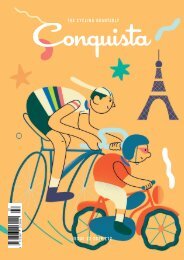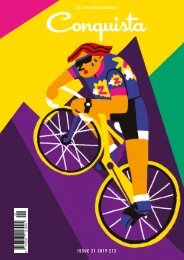CQ26_FINAL_Spreads_Digital
Create successful ePaper yourself
Turn your PDF publications into a flip-book with our unique Google optimized e-Paper software.
knew that if I did, I would start
crying, but because I didn’t
know whether, once I started, I
would ever be able to stop.
One’s assessment of one’s own
achievements is both essential
to one’s own mental health and
maddeningly difficult to control
or predict. There is ample
evidence of this in End to End.
Some riders reach Britain’s
northernmost point and promptly
reverse direction to attempt
the additional record for riding
1,000 miles non-stop. Some
of them succeed, but others
dissolve almost immediately on
leaving John O’Groats, drained
of ambition once their initial target
is achieved. Similarly, some
riders attempt and complete
the entire End to End over and
over again, whereas some do it
once and never achieve or even
attempt anything like it ever
again. Who has succeeded? The
ones who struggled on, or the
ones who quit while they were
ahead? Who has failed? The
ones who tried and powdered,
or the ones who stopped before
they had chance to fall apart?
How can we tell? What counts
as succeeding? And if we don’t
know, what is the point of – well,
of anything?
The present can become unbearably
meaningless for any
one of us at any time. When it
does, there are three options.
Firstly, you can create a new
future for yourself, and try to
find new meaning. Secondly, you
can re-evaluate your own past
life and achievements in such a
way that the present becomes
bearable again. The first option
requires reserves of energy
and optimism that not all of us
possess. The second requires a
soul-searching and personal honesty
not all of us feel capable of.
However, we have no choice but
to attempt one or the other if
we are to avoid the third option,
which is too terrible even to
think about.
With his ride and this book
Jones obviously takes the first
and braver option. The ride may
not have served its intended
purpose, but End to End certainly
seems to have done so, in a
way that would not have been
possible if Jones had never left
his study. “I’ve come to realise
that this book is the journey . .
. I rode to gain experience so
that I could write with clarity
and truth about the journeys
people take.” At the end of any
other book this typically low-key
conclusion might sound rather
banal. Here, for this reader anyway,
it is overpowering. He did
it, reader: he did it.
In the end, then, this magnificent
book is a reminder that
there is only one possible
answer to the ultimate question:
What does it all mean? And that
answer is: It means what you
make it mean. It’s up to you,
and only you. And the best you
can hope for is that, if and when
you get it right, at least you’ll be
able to tell.
Above: Michael Broadwith and Eileen Sheride.
Middle: Paul Jones, Below: Paul Jones with his mum at John O’Groats
160
161















